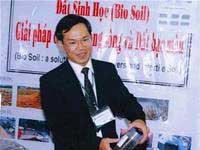 |
|
Mr. Vo Thanh Liem introduces his product. |
At the recent International Agricultural, Forestry, and Aquatic Exhibition, Clean Land Co., Ltd. showcased a range of products made from coconut coir, including organic soil, clean soil, and plywood.
The people of Ben Tre are no strangers to the sight of canals overflowing with coconut coir discarded by individuals who see it as waste. Many regretfully take some home to place around the roots of their plants for moisture retention.
However, for Mr. Vo Thanh Liem, this image reminds him of his father’s words: “Nothing from the coconut tree is wasted, from the trunk, roots to the fruit… it’s just that humans have not fully exploited its potential“. One proof of its usefulness that he witnessed firsthand was the green pumpkin vine thriving when planted on a decaying coconut tree.
Graduating with a degree in chemistry from Ho Chi Minh City University of Science, Mr. Liem began his career in the building materials industry. As the supply of timber dwindled, plywood manufacturers were compelled to seek alternative materials. After experimenting with various plants, they found that coconut coir provided surprising results: it contained lignin that resists termites, fungi, and mold, making it suitable for plywood.
At that time, Mr. Liem recalled the image of the green pumpkin vine growing on the decaying coconut trunk. Instead of launching a plywood product, which he had painstakingly researched, he introduced clean soil made from coconut coir.
Coconut coir is processed to remove impurities and uses chemical methods to extract lignin, supplemented with beneficial microorganisms, disease-resistant microbes, and trace elements, resulting in high nutritional value. During the first trial, his friends who cultivated orchids were very pleased with the results, noting the lush green leaves and abundant roots. They encouraged him to bring clean soil to the market.
“Will it sell well since it’s new to our market and people are used to inorganic fertilizers?” he wondered. “However, when I went online, I was surprised to find that the world was already familiar with the trend of using organic fertilizers,” he said.
It wasn’t until he received a national technical innovation award for this product in 2001 that he officially launched it under the company name Proco, later changing it to Clean Land Co., Ltd.
Clean soil is characterized by its ability to absorb water easily, retain moisture well, drain quickly, and resist pests and diseases… making it suitable for ornamental flowers, bonsai, clean vegetables, as well as nurseries and farms. Since the product’s launch, the company has maintained a steady export volume to Taiwan, which remains a long-term goal for Clean Land.
Continuing their success, the company developed a new product, biological soil, in 2005. This product utilizes microbial methods to convert the tannins in coconut coir into micronutrient salts, acting as a type of fertilizer. Mixing biological soil with agricultural soil enhances fertility, improving impoverished soils. Mr. Liem even refers to it as the “tonic” for the soil, ideal for improving sandy or clayey soil. It also reduces the frequency of watering and prevents pests. On average, the company produces 75 cubic meters of soil daily. Their current major customers include GINO Co., Ltd., Ho Chi Minh City Green Park Company, and Phu My Hung Joint Venture Company.
The plywood product, which Mr. Liem had diligently researched, was only introduced at this trade fair. This product serves a similar function to existing MDF and particle board.
Mr. Liem states that this material is durable, sturdy, and safe due to its termite and pest-resistant properties, meaning that plywood made from coconut coir does not require chemical anti-microbials. He further claims that its durability is higher than that of particle board, with greater resistance to moisture.
Test results from the Ho Chi Minh City Measurement Department indicate a bending strength of over 90 kg/cm² at a thickness of 12 mm. Two domestic partners are already negotiating technology transfer for producing plywood from coconut coir.
Vietnam Economic Times




















































